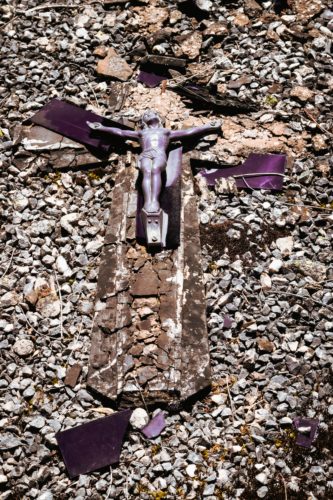
Spiritual but no longer Christian: meet the “Deconstructed”
Posted:Erik Strandness reflects upon many who leave the Christian faith, trading it for something more “spiritual”. But he finds the most challenging questions come from where we might not expect.
Whistle Blowing
Unbelievable? has produced many excellent shows featuring the journeys of high-profile Christians who have walked away from their faith. We must be careful not to dismiss them as marginal believers because they invested much of their lives into the church as PK’s, youth pastors, and worship leaders. I hope that the church listens to their stories because if it doesn’t it is doomed to repeat its mistakes.
However, I want to make it clear that the deconstructed don’t automatically get immunity for religious whistleblowing since many of have ironically gone on to become pied pipers of alternative spiritualities. We need to be grateful for their religious critique but then ask them why they are so intent on creating their own on-line faith communities?
Building Bridges
The reasons they offered for leaving the church varied but appeared to be more concerned with the limitations of the Christian machine than the inadequacy of Christ. The Barna Group has researched the reasons for the exodus and identified six church characteristics that young people cited for leaving their faith.
They describe it as:
- overprotective
- shallow
- antagonistic to science
- simplistic and judgmental regarding issues of sexuality
- exclusive
- unfriendly to those who doubt.

I would argue that while these issues must be urgently addressed they are all peripheral to the saving work of Jesus Christ. People seem to be leaving the church because they don’t like the attitude, hypocrisy, and rules but forget that at its core, Christianity is not about the conduct of the community but the commission of the crucified Christ.
Hypocrisy, legalism, and shallowness are often invoked as the instigators of their exodus yet they seem to forget that Jesus wasn’t too fond of those attributes either.
Jesus isn’t an image carved on our Christian currency, an emblem on our flag, or the poster boy for a better life. He either is or is not the Son of God who emptied Himself, became incarnate, died for our sins, and rose to reveal the life that awaits us.
We need to remember that when we invite Jesus to take up residence in our lives He doesn’t ask us where He should put His theological baggage. I’m fine if they leave Christianity because they reject Jesus’ lifestyle, teachings and work on the cross but if they leave because of His imperfect followers then all they have done is toss the baby Jesus out with the all too frequently rancid church water.

Outside Looking In
I find it quite interesting that it is the thinkers outside the church who take Christianity the most seriously. Incredibly smart people such as historian Tom Holland, social commentator Douglas Murray and psychologist Jordan Peterson each have tremendous respect for the Christian faith.
- Holland is impressed by the way it transformed the moral and ethical norms of culture
- Murray believes that the Christian call to love and forgive one’s enemies is the only therapy for Mad Crowd Disease
- Peterson finds that it contains profound archetypal psychological truths.
Interestingly, the admiration these men have for Christianity makes the critiques of the deconstructed seem quite petty.
God Junk
Interestingly, the data suggests that most of those who leave their faith do so to escape religion but not spirituality. Instead of identifying with a specific tradition they go on to become what has been called “nones.” Rejecting one’s faith tradition, therefore, doesn’t necessarily make one an atheist but rather an indiscriminate spiritual seeker.
The church clearly has its flaws but we should at least give it props for taking the spiritual question seriously. Christians consider faith to be a life-or-death matter. The deconstructed, on the other hand, tend to treat it like an add on to a life of foraging and mating, therapy for existential angst, or a supernatural seal of approval for any lifestyle they choose, each of which makes spirituality metaphysically irrelevant.
While some of the deconstructed adopt atheism, most just become curious agnostics who shop the religious bazaar for spiritual bangles instead of the pearl of great price. Just because our tolerant postmodern spiritual marketplace encourages everyone to set up their own religious booths doesn’t guarantee that they won’t sell you “God junk.”
I’m all about rigorously exploring other faith traditions to find the spiritual real deal but let’s not get lazy and allow ourselves to be deceived by spiritual pretenders. If you are a true spiritual seeker then there are no half-way houses.
Counting the Cost
Agnosticism can be a temporary state of sincere doubt but when it becomes an end in itself it is nothing but a haunted house full of religious ghosts. Agnosticism as a verb is OK but as a noun lacks a certain spiritual gravitas. Those who have left their faith need to take the same passion and courage they brought to their deconstruction and put it to use in thoughtful spiritual rebuilding.
Sadly, it seems that those who explore alternative spiritualities prefer chanting into the emptiness of a God shaped hole rather than counting the cost of properly measuring its dimensions. If the deconstructed don’t take the spiritual journey seriously then all they have really done is rearrange the religious rubble to give it a spiritual Feng Shui. Agnosticism may make for a fun parlor game but is inadequate once the party is over and the bill for a good time comes due.

All Roads Lead to God
Sadly, our postmodern culture fuels the deconstruction by adopting the poorly informed yet profoundly tolerant stance of boldly proclaiming, “All paths lead to God!” How is that possible? At one time, I also held that belief, but once I asked some hard questions about where each path led, it became clear to me they were simply incompatible. Not everyone can be right, so who is?
The concept of many paths leading to the same God raises three serious issues. First, it implies that the object of our spiritual search is nebulous and optional. If God is not universally relevant and consequential then He is not God and our spiritual journeys, rather than pilgrimages to a promised land, are nothing but a series of day hikes to our happy place.
Second, the many paths mentality implies that it is mankind and not God who sets the rules of divine engagement. God becomes known by our, “you are,” rather than His, “I Am.” Finally, while each religious path does end on a mountain top, each one represents a completely different peak. We can get out our megaphones and congratulate each other for reaching the top of our respective ridges, but let’s put aside the silliness that they all represent the same mountain.
I’m afraid that when they reach the summit of each of these spiritual peaks all they will find is a better view of the arctic front of unhappiness heading their way. Sadly, as they take stock of their ability to weather the coming storm, they will find that a COEXIST t-shirt isn’t up to the task. They may have a breath-taking view of the coming tempest but tragically little to protect them from its devastating power.
Toying with Spirituality
I appreciate the stance of the New Atheists because they clearly draw a line in the sand and are quite dismissive of those who walk a tightrope. Christians believe that the source of all being is God and as such are beholden to Him. The atheist believes that spirit doesn’t exist and we are nothing but matter in motion. The Christian God is clearly big while the atheist god is non-existent, but how big is the god of the deconstructed?
Perhaps the first evangelistic question should be – Is your spiritually small or big? Is your spirituality a hobby to distract you from foraging and mating or is it the foundation of all existence? Is your spirituality a chemical reaction or an immaterial something within that wants to communicate with something without? Is your spirituality safe and good or is it good but not safe? Is your relationship with the spiritual a passing acquaintance or an eternal commitment? Do you control your spirituality, or does it control you? If your spirituality is small then it is just a breath of fresh air in a world gone stale but if it is big then in Him we live and move and have our being. It seems to me that if you don’t feel an urgency to answer this question then your spirituality is really nothing more than atheism lite.
Interestingly, while the atheists and Christians battle it out, the deconstructed stay out of harm’s way and sanctify agnosticism. If you are a materialist then your spiritual yearnings are just amusing spandrels but if you believe a spiritual realm exists then don’t treat it like a toy but rather make it your life’s work.
White Board Spirituality
I hope that the deconstructed don’t adopt an Athenian smugness just because their city is full of objects of worship because divine overcrowding inevitably causes people to stub their toes whenever they tour the religious countryside. In addition, inventing an unknown God to avoid conflict gives people permission to place a white board on their personal altar where they are free to scribble down the name of the spiritual flavor of the month. Sadly, when Jesus returns, I don’t think He will be very excited about writing our names in His book of life if we weren’t bold enough to write His name in indelible ink on our altar.
Testing the Spirits
Beloved, do not believe every spirit, but test the spirits to see whether they are from God, for many false prophets have gone out into the world.
(1 John 4: 1)
The deconstructed seem quite interested in testing the spirits but the problem is that the laboratory they have chosen isn’t up to the task. If you really want to assess the efficacy of a religious philosophy then you need to take it to the mean streets, the missions, and the rehabilitation centres because if your spirituality doesn’t work for those most afflicted then it is nothing but words of affirmation for the comfortably unhappy.
If you test religious validity by how it makes you feel then all you are measuring is the buzz you get from the opiate of the masses. Religion isn’t salve for the sorrowful but salvation for the sinner. If you really want to test out your spirituality then ask yourself how it plays at the Union Gospel Mission (UGM)?
Why don’t the poor, destitute, alcoholic, addicted, and homeless practice yoga or meditate in order to transform their lives? Why don’t they just read The Secret or become a Buddhist or a Hindu? The reason is that they have already tried them and found them wanting. Happy thoughts made them party harder, attempting to avoid suffering caused them to practice chemical detachment, and when their Atman became Brahman they developed a bit of a god-complex.
Arguably the most effective method for overcoming addiction is the Twelve Step Program which states outright that humans are powerless to change themselves and need the assistance of a higher power. It’s a philosophy which immediately disqualifies all works-based salvation and leaves only a God who knows our suffering and whose chastisement brought us peace, and by whose wounds we are healed. It appears that the most effective strategy for saving us from ourselves requires twelve tribes, twelve apostles and twelve steps.
We often think that the men and women who enter rehabilitation centres do so because their lives have hit bottom, but I remember one man from the UGM telling me that he didn’t enter treatment because his life had hit his lowest point but because his life was on the line. He wasn’t just sad and depressed but was confronting non-existence. Anxiety, lack of purpose, and meaninglessness may keep us awake at night, but confronting death is the real spiritual wake-up call and while hypocritical judgmental Christians may be annoying, they pale in comparison to the demands of the grim reaper.
I think that the word deconstruction is a bit too strong because when you hear the stories they sound more like tales of spiritual inconvenience rather than matters of life and death. If you want to experience real deconstruction then go to a mission and see truly broken lives. It’s one thing to dismantle one’s ritual and doctrine but quite another to have one’s life completely shattered. If you really want to test spirituality, then take it on a mission trip.
Going All In
I’m so glad that many of those who have deconstructed have been willing to share their stories because the church must be ever vigilant to make sure that it represents the body of Christ and not a social club. I would however encourage them to take that same passion and earnestly seek spiritual truth even if that means offending other faith traditions. If they are bold enough to taste and see that He isn’t good, then they must also be bold enough to place other religious delicacies on the chopping block if they don’t pass the taste test.
Spirituality is either big or little, it is either hot or cold. If it is lukewarm then it is ultimately meaningless and one might as well be an atheist, but if it is true then the heat is on.
I know your works: you are neither cold nor hot. Would that you were either cold or hot! So, because you are lukewarm, and neither hot nor cold, I will spit you out of my mouth
(Revelation 3:15)
All pursuits of the sacred begin with the premise that humans are incomplete until they have made a connection with the spiritual realm. A chasm exists between spirit and matter which must be bridged. Most faith traditions tell us we must build it ourselves and then equip us with tool kits and a special set of building instructions, but Christianity uniquely offers a God who did it for us with just a hammer and a few nails.
I hope that those who sincerely want to rebuild their spirituality will realize that it is far easier to work for an Undercover Boss who emptied Himself than to spend the rest of their life climbing the corporate spiritual ladder.
I think it’s fine to walk the religious marketplace and sample the offerings along the way but if you don’t invest your spiritual capital and go all in then all you have really done is store religious dollars in a silo for a future that may never come, and it may just be that this very night your life will be demanded of you.
Erik Strandness is a physician and Christian apologist who has practiced neonatal medicine for more than 20 years.
Want to learn more? Download your free, exclusive ebook: “God’s Not Dead”